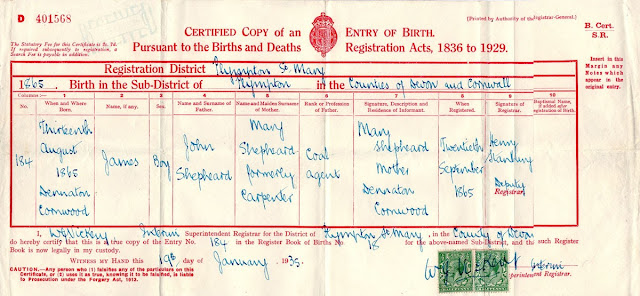I
had no knowledge of the Online Parish Clerk (OPC) program when I first started
my genealogical investigation of British records. It started off innocently
enough when I went to find out more about my direct-line, paternal ancestors.
From
a few bits of information I had about my Shepheard line, including two birth
certificates inherited from my father, I knew my grandfather had been born in a
place called Torquay in Devon, England, and his father had been born in
“Dennaton, Cornwood” (wherever that was), in the “Sub-District of Plympton in
the Counties of Devon and Cornwall.” The birth certificate issued by the General
Record Office for my great-grandfather is shown below.
These
documents gave me a couple of starting points for what would become a very long
and still-not-ended journey. The reference to Cornwood, though, clued me in on
where my initial searches should be concentrated.
I
was feeling flush and adventurous when I finally got seriously involved in
genealogy. One of the first things I did was purchase all of the Cornwood
parish birth/baptism, marriage and death/burial registers which were available on
microfiche. I thought that might be the best way to discover information about
my family – go through all the registers myself and find the actual entries
pertaining to the individuals. I had my own microfiche reader/printer so it was
no problem to order and use the films at home.
At
the time, I did not realize how lucky I was going to get. It turned out that my
ancestors had lived in the Cornwood area as far back as the early 1600s so I
was about to discover hundreds of them, over eight generations, hidden in the
registers.
Interestingly,
when I found my great-grandfather’s baptism entry, there was very little
information shown. Without the birth certificate I would only have been able to
identify him at the time from census data. The Vicar appears to have lost his
notes when it came time to fill in the page in the baptism register, as can be
seen in the image below! Information for one other child baptized the same day
was also missing.
1865 September 5
– baptism entry for [James} Shepherd [sic],
in Cornwood parish baptism register #823/4, page 42; image accessed from
FindMyPast March 5, 2010, copyright Plymouth West Devon Record Office
This
is one of those curious situations that can be encountered occasionally with
old parish records. One has to work around them, using other sources, in order
to find the full information about some individuals. James did appear on the
England census for the first time in 1871, at the age of five. His family were
then living in Ermington Parish, very near that place called Dennaton,
Cornwood. In any case, all other Shepheard children born around this time were
identified in the register leaving me to conclude that the incomplete record
had to be for James.
Portion of 1871
England Census enumerator’s sheet, page 2, folio 53, piece 2107, class RG10;
showing John
Shepheard family living in Ermington Parish, Devon;
image accessed from Ancestry November 3, 2006,
copyright The National Archives
I
did finally put together almost everything I have learned about my Shepheard
line in Devon, in a book that was distributed to many family members last
month. The early reactions from some of them are amazement of what all I have
found out and delight in seeing the history of the family laid out. It inspires
me to keep going with my other lines.
As
many people have found in their research in England, indeed, Great Britain,
parish registers are among the more important sources of information about
people. They contain the basic data on individuals – births, marriages and
deaths – over long periods of time. Not all registers are complete, or have
been preserved for every parish, and not all individuals who were born in the
various parishes were baptized, married or buried there. But the registers do
provide an excellent initial source to search for ancestors.
I
always like to get my data in an organized form; so, from the beginning, I
started transcribing all the register entries and putting the information on
spreadsheets. Shortly after receiving the fiche, I decided I could probably
help others find their ancestors, since I now had the data in hand. That’s when
I volunteered to become the OPC for Cornwood. Before long I had also purchased
the fiche for the registers of the adjoining parishes of Harford, Plympton St.
Mary and Plympton St. Maurice (I said I was feeling flush in those days) and
took on those parishes as well.
Over
time, and with the help of many other volunteers, we have transcribed almost all
of the BMD registers from my four parishes – now over 70,000 individual entries
from over 7,400 register pages. We have also done most of the censuses in the
area, another 31,000 entries from over 2,300 pages. From that work, I have a
searchable database that speeds up answering questions from other researchers.
Having the information on a spreadsheet also allows me to sort the data and
recombine it to show individual family summaries, over many generations in some
cases.
I
have had hundreds of queries, from people all over the world, looking for
information about their families who lived in my parishes or somewhere in Southwest
Devon. Most I have been able to help by providing BMD, census and other data that
filled in missing pieces of their family history and even broke down a few
brick walls. It is always gratifying to be able to assist people in discovering
their ancestors and give them more avenues in which to search.
Some
of the queries have resulted in some very interesting and surprising stories, many
of which I will discuss in later posts.


